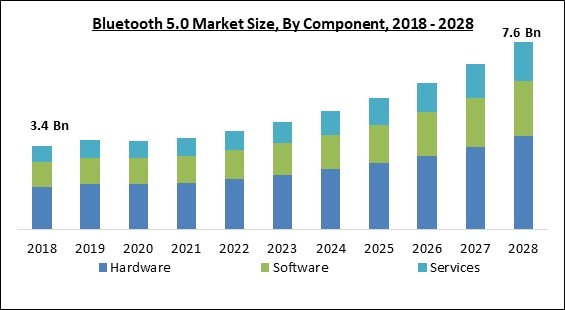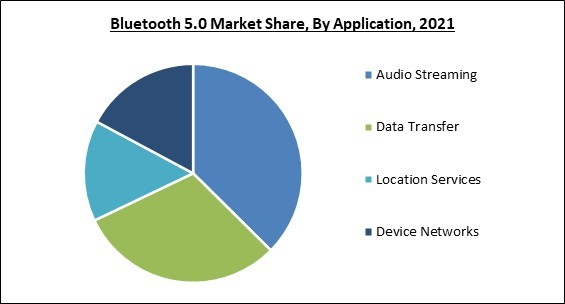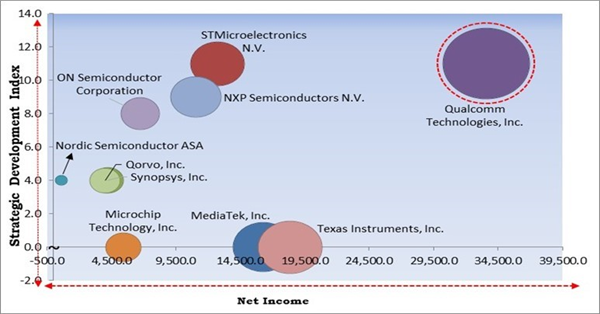The Bluetooth Special Interest Group (SIG), which includes more than 35,000 members from the telecommunications, computing, networking, and consumer electronics industries, is responsible for managing Bluetooth. It was standardized as IEEE 802.15.1, but the IEEE no longer upholds the standard.
The Bluetooth SIG is in charge of managing the qualification process, developing the specification, and defending trademarks. To sell a product as a Bluetooth device, the manufacturer must adhere to Bluetooth SIG standards. The technique is covered by a network of patents, which are licensed to specific qualifying devices.
On December 6, 2016, the Bluetooth SIG announced Bluetooth 5.0, New Internet of Things technology is the main emphasis of its new features. With its Xperia XZ Premium, Sony was the first to reveal Bluetooth 5.0 functionality in February 2017 at the Mobile World Congress. In April 2017, the Samsung Galaxy S8 went on sale with Bluetooth 5 compatibility. With Bluetooth 5 capability, the iPhone 8, 8 Plus, and iPhone X were introduced in September 2017.
COVID-19 Impact Analysis
The COVID-19 pandemic caused a health crisis and continues to have an impact on all facets of professional and personal life. The COVID-19 pandemic affected a wide range of industries, and at the time of its commencement, analysts were unable to foresee the full effect the pandemic would have on market estimates. Despite the fact that several Bluetooth markets have had slower growth than anticipated, according to the recently published 2021 Bluetooth Market Update, analysts expect to see annual growth pick up as head towards 2021. Some Bluetooth markets discovered an opportunity to prosper during this difficult period. Bluetooth PC accessories grew as more people across the world started working from home.Market Growth Factors
A Wide Variety of Bluetooth Location Service Devices Are Available
Bluetooth technology is widely used as a device positioning solution to meet the increasing demands for high-accuracy indoor location services in a variety of applications, including personal item finding, indoor navigation, asset tracking, and digital keys. A Bluetooth device can identify the location, size, and direction of other devices. It offers versatility unmatched by any other positioning radio, enabling owners and managers of buildings to scale indoor positioning solutions to meet shifting building requirements. For the best resource and inventory control, commercial and industrial establishments are increasingly turning to Bluetooth asset management systems. When it comes to Bluetooth Location Services, RTLS and tags have taken the lead in propelling continuing growth of the Bluetooth 5.0 market.The Utilization and Output of Smartphones Are Increasing
Government support for the production of smartphones is progressively increasing. Imports of smartphones raise the price of cell phones, preventing their widespread use. Modern technology advancements like Android smartphones and smart living are gradually affecting people's lives. The short-wavelength radio transmissions used by Bluetooth technology, which aims to exchange data wirelessly over short distances, are supplying the essential technology for convenience, intelligence, and controllability. This proposes and prototypes a novel Smart Living system dubbed a home lighting control system using an Android smartphone with Bluetooth.Market Restraining Factors
Interference with Bluetooth Packets
For every wireless system, interference has been one of the main obstacles to enabling dependable data connectivity. Since Bluetooth and Wi-Fi devices and other wireless technologies share a transmission medium, a data packet can be damaged or destroyed during transmission if it collides with another packet that is also being communicated at the same time and on the same frequency channel. A proposed interference awareness technique is based on the BLE connection's packet state. To identify interference as soon as feasible in the BLE connection, many properties of each packet sent and received are tracked.Component Outlook
Based on the Component, the Bluetooth 5.0 Market is segmented into Hardware, Software, and Services. The hardware segment acquired the highest revenue share in the Bluetooth 5.0 market in 2021. It is because more chances in the Bluetooth 5.0 technology solutions have been created as a result of the rise in demand for high-speed, secure, and reliable wireless communication technology, which has also led to the creation of a variety of use cases. Hardware for Bluetooth 5.0 consists of SoC, RF, development boards, sensors, and controllers.Application Outlook
On the basis of Application, the Bluetooth 5.0 Market is divided into Audio Streaming, Data Transfer, Location Services, and Device Networks. The device networks segment recorded a substantial revenue share in the Bluetooth 5.0 market in 2021. Bluetooth mesh networking enables communications between several devices. It is appropriate for building monitoring, control, and automation systems wherein tens to thousands of units must reliably and securely interact with one another.End User Outlook
By End User, the Bluetooth 5.0 Market is classified into Consumer Electronics, Wearables, Automotive, Retail and Logistics, Healthcare, Smart Home/Building, Industrial Measurements and Diagnostics, and Other End Users. The automotive segment registered a significant revenue share in the Bluetooth 5.0 market in 2021. Because the car has rudimentary Bluetooth connectivity, can couple it with a phone and use some features without needing to connect it to a cable. The biggest benefit of doing this is that users can use the car's speakers to make hands-free phone conversations.Regional Outlook
Region-wise, the Bluetooth 5.0 Market is analyzed across North America, Europe, Asia Pacific, and LAMEA. The North America segment acquired the largest revenue share in the Bluetooth 5.0 market in 2021. It is because the nations are stable and well-established, enabling them to make significant investments in R&D operations and contribute to the creation of new technology. The area is well renowned for its rapid adoption of cutting-edge technologies, including IoT, wearables, autos, smart cities, smart businesses, smart agriculture, and linked and autonomous vehicles.Cardinal Matrix-Bluetooth 5.0 Market Competition Analysis
The major strategies followed by the market participants are Acquisitions. Based on the Analysis presented in the Cardinal matrix; Qualcomm Technologies, Inc. is the major forerunner in the Bluetooth 5.0 Market. Companies such as STMicroelectronics N.V., NXP Semiconductors N.V. and ON Semiconductor Corporation are some of the key innovators in Bluetooth 5.0 Market.
The market research report covers the analysis of key stake holders of the market. Key companies profiled in the report include Qualcomm Technologies, Inc., Nordic Semiconductor ASA, MediaTek, Inc., STMicroelectronics N.V., NXP Semiconductors N.V., Microchip Technology, Inc., ON Semiconductor Corporation, Texas Instruments, Inc., Synopsys, Inc. and Qorvo, Inc.
Strategies deployed in Bluetooth 5.0 Market
Partnerships, Collaborations and Agreements:
- Jun-2022: STMicroelectronics introduced third-generation BluetoothSystem-on-Chip (SoC) improved by Bluetooth technology, applications that track location and real-time position. The new technology decides the approach of the direction of Bluetooth Low Energy (BLE) signals, Bluetooth 5.3 Certified BlueNRG-LPS SoC can exactly determine activities and locations with centimeter precision. Moreover, it leverages Bluetooth-specific technology, which contains angles of arrival (AoA) along with the angle of departure (AoD) estimated from the signals recorded from an exhibition of antennas.
- Oct-2020: NXP Semiconductors introduced Bluetooth/BLE solutions along with a 2x2 Wi-Fi 6 (802.11ax) Dual Band. The solutions power a new step of connectivity innovation for refined audio, gaming, industrial and IoT markets. Additionally, by allowing the world’s foremost Wi-Fi 6-enabled gaming console, NXP’s optimized IW62X family of products would deliver improved efficiency, capacity, and performance for next-generation connectivity solutions adding smart consumer IoT hubs, video-enabled smart devices, augmented and virtual reality (AR/VR) devices, wireless speakers, and a universe of additional IoT applications.
Product Launches and Product Expansions:
- Jul-2022: NXP Semiconductors signed a memorandum of understanding with Hon Hai Technology Group, the world's biggest electronics manufacturer. Through this agreement, the companies aimed to design platforms for a new era of smart connected vehicles. Moreover, the main focus of the expanded collaboration is aimed at Foxconn’s efforts in electrical vehicle (EV) platforms, utilizing NXP’s system expertise and complete electrification offering, from NXP S32 processors to analog-front-end, networking, drivers, and power products. Furthermore, another focus is connectivity solutions utilizing the latest NXP S32 domain and zonal controller family for gateways and vehicle networking control, while also offering safe car access with Bluetooth Low Energy (BLE) and ultra-wideband (UWB.
- Sep-2020: Nordic Semiconductor came into a partnership with Amazon, an American multinational technology company. Through this partnership, the companies aimed to design Bluetooth Low Energy (Bluetooth LE) solutions for Amazon Sidewalk. Additionally, by collaborating with both Amazon Sidewalk and ACS, Nordic would be capable to assist consumers to construct smart home products that would obtain even greater comfort, flexibility, and security to customers.
- Apr-2020: Synopsys came into a partnership with Broadcom, a worldwide leading provider of solutions for wireless LAN infrastructure. Through this partnership, the companies aimed to develop semiconductor solutions utilizing Synopsys' Fusion Design Platform to manage a host of design barriers at 7nm and beyond. Additionally, Synopsy's vision of success and timely implementation of the delivery of differentiated value guarantee to deliver together on superior technology.
Acquisitions and Mergers:
- Apr-2022: Qualcomm completed the acquisition of the Arriver from SSW Partners, a New York-based investment firm. This acquisition would enhance Qualcomm Technologies' capability to provide open, completely integrated, and competitive Advanced Driver Assistance System (ADAS) solutions to automakers and Tier-1 suppliers at scale.
- Nov-2021: ON semiconductor took over GT Advanced Technologies, a manufacturer of silicon carbide. With this acquisition, ON semiconductors can now deliver end-to-end power solutions from SiC crystal growth to completely incorporated intelligent power modules.
- Nov-2020: Qorvo completed the acquisition of the 7Hugs Labs, a foremost software provider for ultra-wideband applications. This acquisition would reinforce Qorvo’s UWB product portfolio for smartphones and other devices that enhance the precision of a host of new location and communication assistance.
- Oct-2020: STMicroelectronics took over SOMOS Semiconductor, which specialized in silicon-based power amplifiers and RF Front-End Modules (FEM) products. Under this acquisition, ST strengthens its technical staff, IP, and development of Front-End Modules for the IoT and 5G markets. Additionally, the first product - an NB-IoT / CAT-M1 module is already an ongoing qualification and would be the beginning of a new roadmap of connectivity RF FEM products.
- Jul-2020: STMicroelectronics acquired BeSpoon and Riot Micro. This acquisition would enhance ST’s living wireless microcontroller which contains Bluetooth 5.0 and IEEE 802.15.4 communication protocols along with the globe’s first LoRa boosted System-on-Chip. Moreover, Wireless microcontrollers are part of the STM32 product range of over 1000 various devices and with over six billion parts dispatched to consumers. With these acquisitions, the company would manage all wireless IoT communication standards.
Scope of the Study
Market Segments Covered in the Report:
By Component
- Hardware
- Software
- Services
By Application
- Audio Streaming
- Data Transfer
- Location Services
- Device Networks
By End User
- Retail & Logistics
- Smart Home/Building
- Consumer Electronics
- Automotive
- Wearables
- Healthcare
- Industrial Measurements & Diagnostics
- Others
By Geography
- North America
- US
- Canada
- Mexico
- Rest of North America
- Europe
- Germany
- UK
- France
- Russia
- Spain
- Italy
- Rest of Europe
- Asia Pacific
- China
- Japan
- India
- South Korea
- Singapore
- Malaysia
- Rest of Asia Pacific
- LAMEA
- Brazil
- Argentina
- UAE
- Saudi Arabia
- South Africa
- Nigeria
- Rest of LAMEA
Key Market Players
List of Companies Profiled in the Report:
- Qualcomm Technologies, Inc.
- Nordic Semiconductor ASA
- MediaTek, Inc.
- STMicroelectronics N.V.
- NXP Semiconductors N.V.
- Microchip Technology, Inc.
- ON Semiconductor Corporation
- Texas Instruments, Inc.
- Synopsys, Inc.
- Qorvo, Inc.
Unique Offerings from the Publisher
- Exhaustive coverage
- The highest number of Market tables and figures
- Subscription-based model available
- Guaranteed best price
- Assured post sales research support with 10% customization free
Table of Contents
Companies Mentioned
- Qualcomm Technologies, Inc.
- Nordic Semiconductor ASA
- MediaTek, Inc.
- STMicroelectronics N.V.
- NXP Semiconductors N.V.
- Microchip Technology, Inc.
- ON Semiconductor Corporation
- Texas Instruments, Inc.
- Synopsys, Inc.
- Qorvo, Inc.











